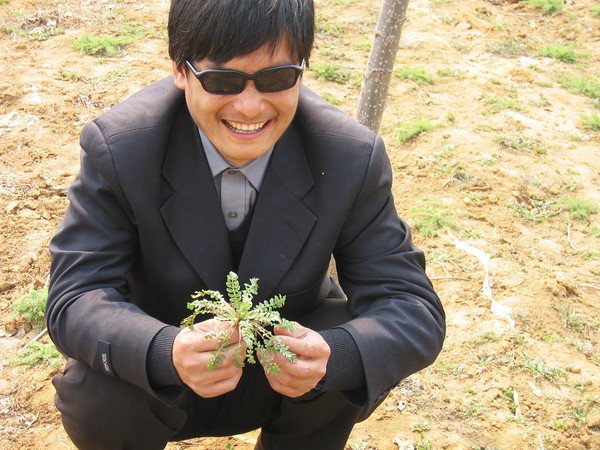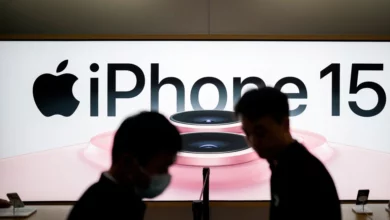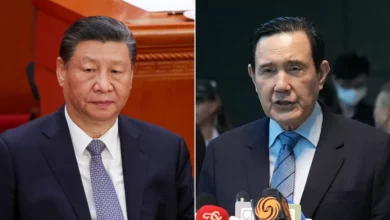
Blind Chinese dissident Chen Guangcheng appealed on Thursday for asylum in the United States, throwing into doubt an agreement used to coax him out of hiding in the US Embassy in Beijing and fanning US-China tensions at a sensitive time.
The standoff appears particularly troublesome for the Obama administration, with Chen saying he now fears for his and his family's safety if he stays in China, as was planned under the deal that Washington called a good outcome for the dissident.
China's Foreign Ministry declined to comment on Chen's request to leave the country and repeated its criticism of the way the United States had handled the issue as "unacceptable."
Chen, a self-taught legal activist, left the US Embassy on Wednesday and is now under Chinese control in a Beijing hospital. He had taken refuge at the US mission for six days after escaping house arrest and left after US officials assured him that Beijing had promised to improve his circumstances.
But Chen said on Thursday by telephone from hospital, where he was escorted by US officials and was being treated for a broken foot, that he had changed his mind after speaking to his wife who spoke of recent threats made against his family.
"I feel very unsafe. My rights and safety cannot be assured here," he said. His family, who were with him at the hospital, backed his decision to try to reach the United States, he added.
The activist, citing descriptions from his wife, Yuan Weijing, said his family had been surrounded by Chinese officials who menaced them and filled the family home. Chen, from a village in rural Shandong province, has two children.
"When I was inside the American Embassy, I didn't have my family, and so I didn't understand some things. After I was able to meet them, my ideas changed."
A senior US official later said the United States was seeking to clarify Chen's wishes and continued to discuss his fate with the Chinese government.
"When we feel that we have a clear view of what his final decision is, we will do what we can to help him achieve that," the official said.
The timing of the Chen case comes at a fragile time for both nations: President Barack Obama will be sensitive to any criticism of the handling of Chen in the run-up to a November presidential election and China is struggling to push through its own leadership change late this year.
That carefully choreographed transition has already been wrong-footed by the downfall of ambitious senior Communist Party official Bo Xilai after he was caught up in a scandal linked to the apparent murder of a British businessman.
Secretary of State Hillary Clinton found herself in the eye of the diplomatic storm on Thursday, turning up for the opening of annual bilateral talks in Beijing which have been overshadowed, but not derailed, by the Chen case.
She used the occasion to urge China to protect human rights but made no specific mention of Chen, whom she had spoken to on Wednesday after he left the embassy.
"Of course, as part of our dialogue, the United States raises the importance of human rights and fundamental freedoms," Clinton said. "We believe all governments have to answer our citizens' aspirations for dignity and the rule of law and that no nation can or should deny those rights."
Despite Chen's change of heart about staying in China, it was unclear if he would be able to travel to the United States.
US officials appeared no longer to be with him on Thursday, with the dissident saying he had still not had an opportunity to explain his change of heart to the US side.
"I hope the US will help me leave immediately. I want to go there for medical treatment," Chen said from the hospital, where a pack of camera crews and reporters was waiting outside, kept away from the entrance by police.
US-China deal breaks down
Washington had hoped its deal with Beijing over Chen would defuse the crisis, with both Clinton and US Treasury Secretary Timothy Geithner in the Chinese capital for this week's talks — in which the United States will aim to secure more cooperation from China on trade and international flashpoints such as North Korea, Iran and Syria.
Under the deal, according to US officials, Chen and his family would have been relocated within the country in safety and he would have been allowed to pursue his studies.
But Chinese authorities have taken a tough tone, criticizing what they called US meddling and demanding an apology for the way US diplomats handled the case.
Chinese President Hu Jintao made no mention of the Chen case in his remarks to the US-China talks but stressed that the two nations needed trust.
"It is impossible for China and the United States to see eye-to-eye on every issue, but both sides must know how to respect each other," he said.
Earlier, in comments aired on CNN, Chen said: "I would like to say to President Obama, please do everything you can to get our family out."
Doubts and questions
Chen, 40, is a legal activist who campaigned against forced abortions under China's "one-child" policy. He escaped 19 months of house arrest, during which he and his family faced beatings and threats, late last month.
US officials had said Chen left the embassy of his own free will because he wanted to be reunited with his wife and children. They said he wanted to remain in China and never asked for asylum.
Chen's dramatic escape from house arrest and his flight last week to the US Embassy have made him a symbol of resistance to China's shackles on dissent, and the deal struck by Beijing and Washington would have kept him an international test case of how tight or lose those restrictions remain.
Now, however, his change of mind throws not only his own future into doubt, but also raises questions about the wider US-China relationship.
It could also prove politically costly for Obama, who has already been accused of being soft on China by Republican presidential candidate Mitt Romney and who could now face further criticism over Chen's case.
What initially appeared to be a foreign policy success for the Obama administration could quickly turn into a liability.




